How Aussie pop star Kate DeAraugo fell from pop stardom into ice addiction
The pressures of stardom after winning the Australian Idol crown in 2005 pushed Kate DeAraugo into eight horror years of addiction, arrests, court appearances and violence. But now she’s making a remarkable recovery.
VWeekend
Don't miss out on the headlines from VWeekend. Followed categories will be added to My News.
Kate DeAraugo has been to dark places. She has been to depths most of us don’t want to even imagine, and if we did experience would do everything in our power to forget, locking away the memories and hiding them from the world.
But the former Australian Idol winner doesn’t shy away from her worst days, and instead celebrates finding her way back and hopes her story can inspire others.
“After all this mess, and pain and hurt, there has to be hope,” DeAraugo tells VWeekend.
“I hope by me being brave and vulnerable, it might encourage somebody to be brave and vulnerable too, and know, when I say to them: ‘There is a way out’.”
DeAraugo, a chart-topping singer-songwriter, found her “way out” six years ago. She has been drug and alcohol free since 2018.
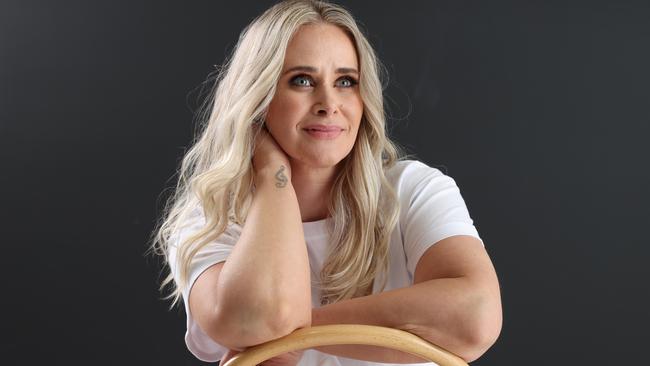
Her maze of insecurities and self-loathing triggered cocaine and nitrous oxide abuse, then a nightmarish eight years locked in the grips of ice addiction.
At its worst – and DeAraugo does not consider this incident a “rock bottom” event – she was rushed to hospital after a former partner hacked into her leg with a machete during a drug-fuelled rage.
“I got stabbed in one of his … angry ice events,” DeAraugo reveals on her podcast series, Why Do I Feel This Way, which launches on Tuesday.
“I ended up with a machete in my leg, and in a hospital lying about it. I said I fell on a bit of tin on a job site. And they looked at me like, whatever.
“In the back of my mind, it was a story I told myself … ‘I’m not an addict. I don’t end up in these places. I come from a good home’,” DeAraugo says.
“But this shit doesn’t give a f--k who you are. It doesn’t care where you came from, who your mummies or daddies are, or what school you went to.
“I could tell you a million shocking stories about where, and how, and what we used,” she adds.
“But the difference in this situation was what happened on the inside. It was a slow-burning emotional death. I’d lost everything – my career, beautiful relationships, friends, all my money.
“I’d lost all hope. I didn’t want to live anymore but, to be honest, I was too gutless to die.”
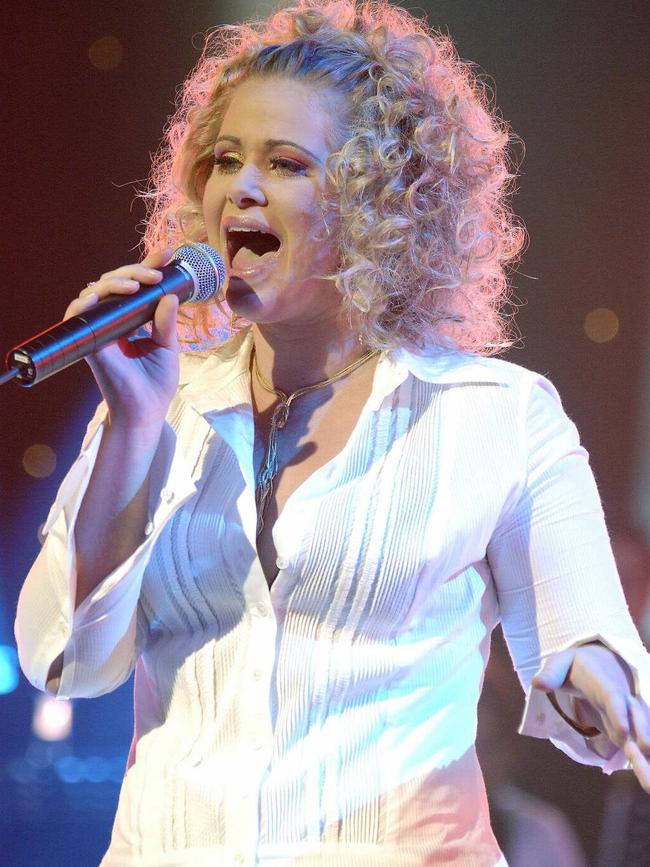
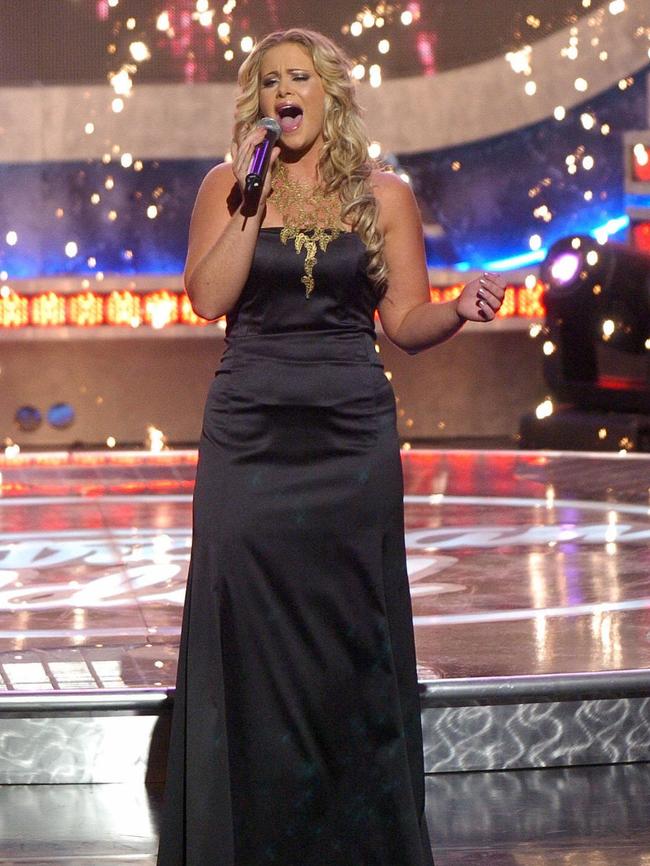
Kate DeAraugo, from Bendigo, in regional Victoria, shot to prominence on Australian Idol, a megawatt smiling, blue-eyed “girl next door” with powerhouse pipes.
She won the singing contest in 2005, but not before copping cruel comments about her weight and appearance.
Those barbs hurt. In her younger days, DeAraugo struggled with body issues. That judgment, on national TV, made it worse.
Her first single, Maybe Tonight, debuted at No.1 on the ARIA singles charts. Her album, A Place I’ve Never Been, was certified platinum.
DeAraugo was also a member of the Young Divas, an all-female hit machine with Ricki-Lee Coulter, Paulini, Emily Williams and Jessica Mauboy.
However, even with those successes in her resume, the anxieties about body shape and pop star ideals kept haunting DeAraugo.
Soon after Idol, and the hits, music industry friends introduced her to cocaine.
She was 20 years old and living in Sydney.
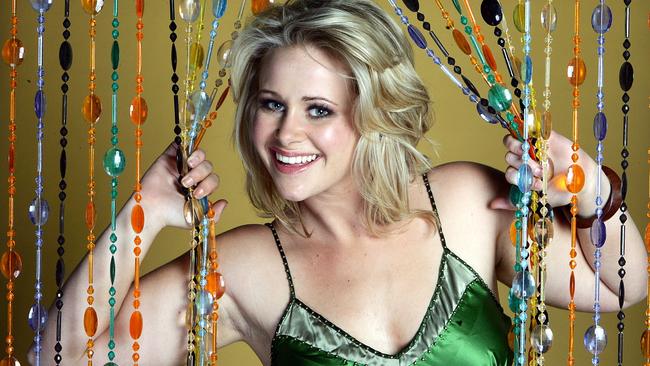
“It felt innocent at the time. And I was finally in with the cool kids,” she says.
“Suddenly, I fit in, which was something I’d struggled with forever. It took away those inhibitions.”
After coke, DeAraugo used nitrous oxide (“an awful, awful drug”) and tried ice for the first time during a road trip from Airlie Beach to Mackay with a friend of a friend.
It was around 2009.
She says that on the drive, she realised her fellow traveller was on drugs: “I don’t know what you’re on, but you need to give some to me,” DeAraugo says she told him.
“He pulled out a pipe and a bag of meth. And that was it. It was the first time I tried meth and I became an everyday user for the next seven years.”
On her podcast, DeAraugo explains her attraction to ice: “Meth is a different world and it takes you on a different adventure. You go into another land and another place. And in the beginning – I know this sounds terrible – it was wonderful, it almost made me feel like I was a better person for it. I was able to achieve more, I was able to do more. I felt like I was achieving shit in my life, until I wasn’t.”
Those seven years of deep addiction are a blur, especially dates and places, DeAraugo says. She spent time living in Mackay, Sydney, Mooroopna and Shepparton. But her problems sparked the occasional news headline.
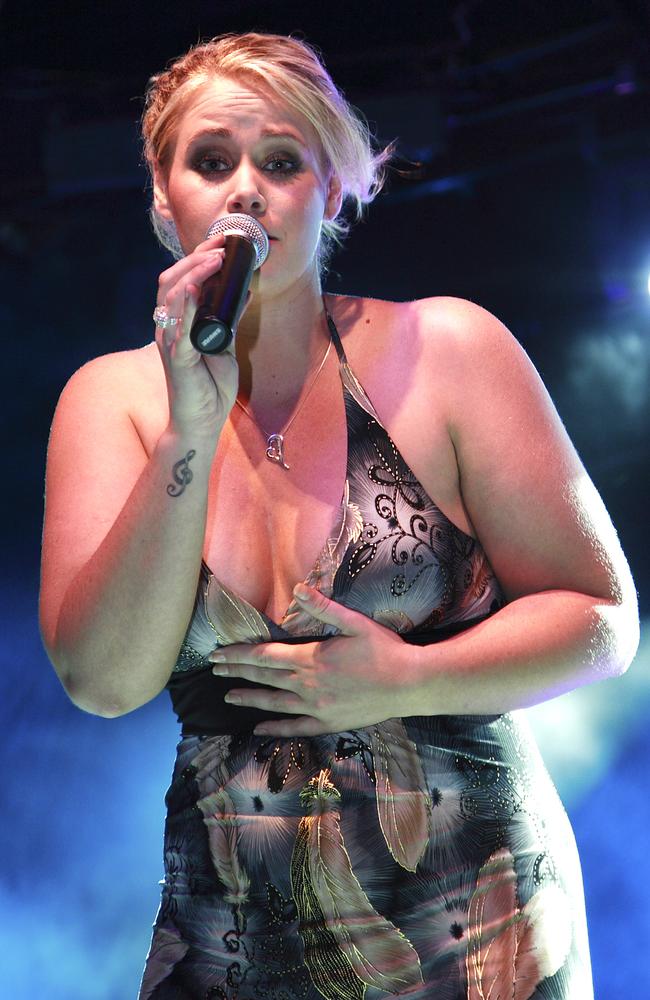
She lost her license and was fined by a Sydney court for drug driving in 2015.
“I didn’t care at that point,” she says.
“I was well and truly in the grips of meth addiction. All I wanted was for everybody to f--k off out of my face so I could use, and it hurts my heart to say that. I lost all hope, want, or care to be any version of the Kate everybody knew.”
Two years later, she was convicted on drug and weapons charges by a Bendigo court.
“By then, I was so disassociated from what was happening in my life, and the people I was hanging out with,” DeAraugo says.
“I didn’t know what was in my car at any given time. I didn’t know and I didn’t care. There were knives and tomahawks on the back seat. I was driving, so they became my problem.”
She added: “I would have moments of realising how much trouble I was in, and how much I wanted to change, but by then, I was a full time drug addict. Choice gets removed. Choice was gone.”
She says the house in Mooroopna, which she shared with 10 others, was a low point.
“It was that real drug den life,” DeAraugo says.
“I didn’t have a phone, I didn’t have any money. I was just in this house waiting for the scraps … (and) somebody to offer me a bump, or a point, or a puff. Those memories hurt.”
It was there she met and fell in love with a mystery man – the one who would eventually stab her with a machete.
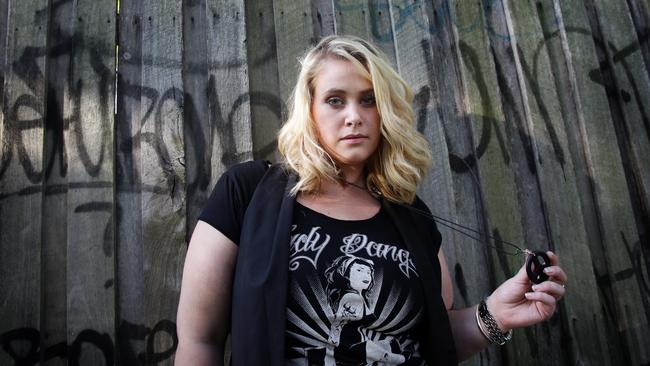
“In all of my sickness, feeling abandoned, and not loved … this person made me feel totally acceptable (even with) scabs on my face and all my junkieness. He made me feel desirable. It was like a new level of addiction,” she says.
But soon, the mental and physical abuse started.
“He hurt me mentally … before he hurt me physically,” DeAraugo says.
“By the time he hurt me physically, it was shocking.”
The man also taught her to “use drugs in a way that I’d never known before”.
“I asked him, ‘Why did you do that to me?’ And his words were, ‘Because I didn’t want to lose you.’ Everybody had warned me about this person. And I was deluded. And I was like, ‘No, I’m different. He’ll treat me different. He would never do that to me’ – until the day he did.”
Amid the drug haze, court appearances, sobbing phone calls home, and numerous attempts to quit, DeAraugo’s family never gave up on her.
“They’re the most incredible force,” DeAraugo says.
“My mum, bless her heart, she never stopped believing in me. She fought for me like a lion. Dads get angry, and siblings get angry, but my mum was in the trenches to the end.”
She adds: “I had friends who were there, too, who wanted to help, but I pushed them away.”
DeAraugo’s rock bottom and moment of clarity was undramatic and unexpected.
“I caught a glimpse of myself in the mirror,” she says.
“I was bone thin, my face was messed up and I was alone. And I looked at myself and thought, ‘Who are you?’ Call it a moment of sanity or divine intervention, but I knew … if things didn’t change, I was going to die.”
She called her mum, Sue, to pick her up.
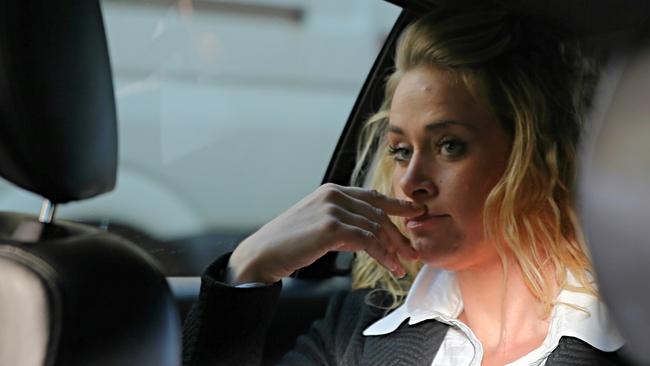
A week later, DeAraugo returned to her house in Bendigo to pack up and leave for good.
“It was putrid,” she says.
“I didn’t have any valuables left. I’d hocked it all.”
However, hidden in a cupboard, DeAraugo uncovered a few precious leftovers – one was a tub of fan mail from her Idol days, and the other, the show’s famous golden ticket. The irony of finding that shiny token, a symbol of promise and potential, is not lost on her.
“I’d like to say that was the last time I used drugs, but it was a month later that I used for the last time,” DeAraugo says.
She smiles and says proudly: “I’m drug and alcohol free for nearly six years now. But it’s an internal peace for me. I knew I had to change, but … the next steps to full recovery and survival was putting down the drugs and dealing with … years of pain and avoidance and hatred for myself.”
She adds: “There’s no end date for me in recovery. It’s an ongoing thing, it’s a one day at a time proposition. I have a lot of respect for my addiction and where I’ve come from.”
Her treatment included a hospital lockdown facility for six weeks, for detox, then rehabilitation and recovery in a transition house.
DeAraugo also attends a support group for addicts, and does therapy. She has nothing but love and respect for those helping her path to recovery.
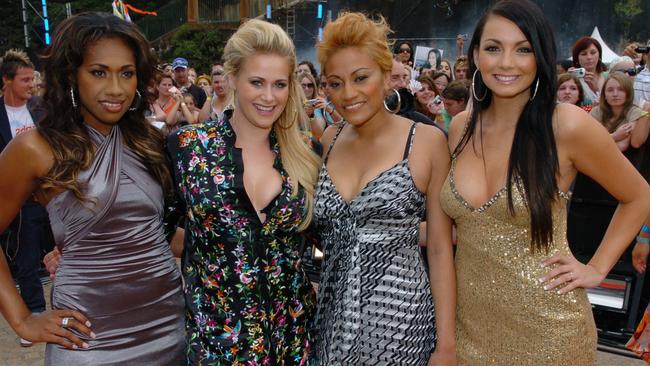
“The disease of addiction is very cunning
and powerful. It can tell you things that make total sense, but it’s a way (to lure addicts) back,” she says.
“My disease wanted to kill me. I’ve had to put my life in the hands of other people, and trust what they say to keep me safe from myself.”
Therapy has taught DeAraugo to be kinder to herself.
“On paper, there was nothing in my life to suggest I was unsafe or unloved,” she says, “but there was this narrative I made up that I was unlovable and unacceptable. That grew, especially when I stepped into the public arena.”
She doesn’t regret doing Australian Idol.
“There was so much goodness in it,” DeAraugo says.
“I got to do unbelievable shit, all the things I dreamt about as a little girl.”
Still, DeAraugo says it was painful to see her Young Divas peers thrive while she sat in a dark room somewhere doing drugs.
“I had a lot of second chances, but I couldn’t rally and get my shit together to restart my career,” she says.
“The other girls were already on their journeys. It was hard to watch their successes … and know that my life choices stopped me from having the same.”
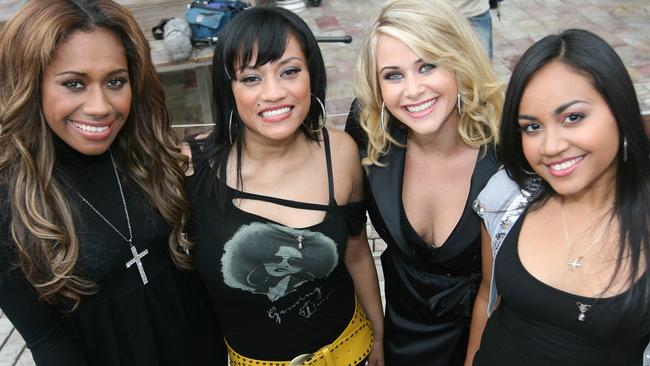
Seven years after seeing her drug-ravaged image in the mirror, Kate DeAraugo is reflecting on her new life. She is clean, sober and happy. She is in a loving relationship with her partner, Shannon, and last December, DeAraugo gave birth to her son, Hudson.
“I never thought I’d get the opportunity to be a mum. I thought I’d missed out on that part of my life,” she says.
“I’m so grateful I have a beautiful, healthy baby boy, and I show up for him every day as the person I want to be. This is the craziest thought ever, but I am the stability in his world. I didn’t think I’d ever be stable for anything. He’s taught me a lot already, and I now know the true meaning of unconditional love.
“He’s brought so much joy, and it’s a real blessing.” She adds wistfully: “He also saved me on another level.”
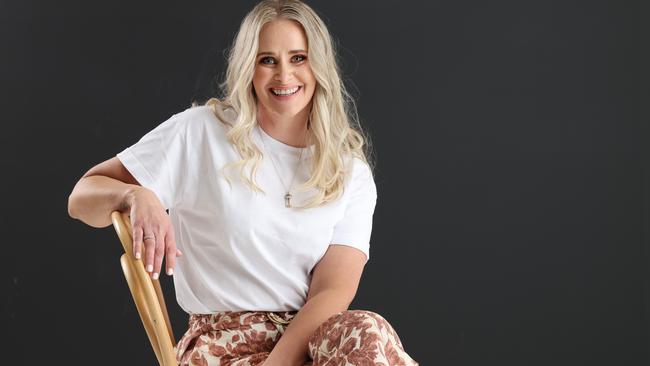
That, sadly, alludes to the passing of Sue DeAraugo, Kate’s mum, and her biggest champion, last year. Sue died when Kate was 13 weeks pregnant. She met Shannon before the pandemic and lockdowns.
“Covid fast-tracked the relationship,” she says, laughing.
“We spent a lot of time stuck inside. If we got through that and still liked each other, it was a good sign.
“He’s brought a very calm energy to my life. I’ve never felt safe and secure in a relationship – emotionally, physically, mentally – until now.
“My relationships, when I was using, were always hectic, unstable and manic. The only thing I had a relationship with was my drugs.
“It sounds terrible, but I wasn’t capable of showing up for another human being. I’d be able to present a part of me that I desperately wanted to be, but I wasn’t able to sustain it.”
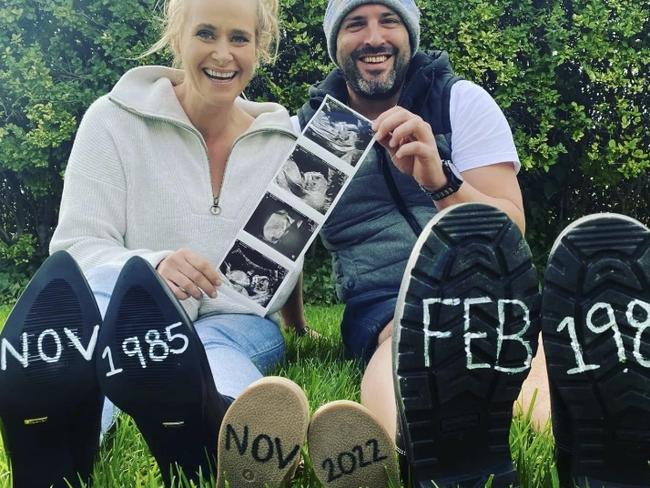
DeAraugo says she is still rebuilding her friendships and mending burnt bridges from the past.
“When I got clean I had to live with a lot of things. I had to live with a lot of hurt I had caused people. At that time, I had little choice. But my life is nothing but choice now,” she says.
“I choose every day to do the right thing, and I live my amends on a daily basis.”
She has also built a career in the unlikeliest place: construction. So far, she’s worked in traffic control, level crossing removal, and has civil construction certificates to operate forklifts, bobcats and excavators. And she loves concreting.
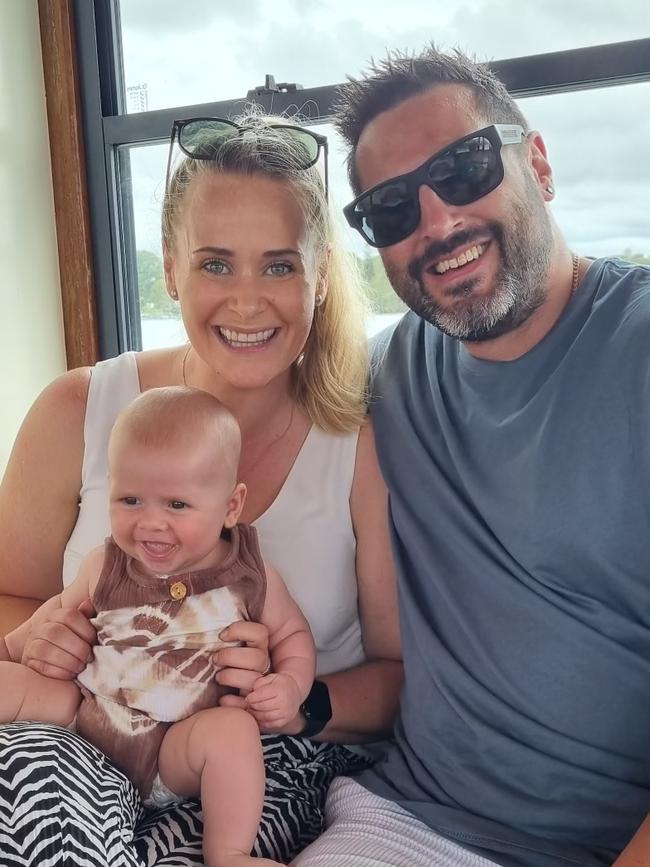
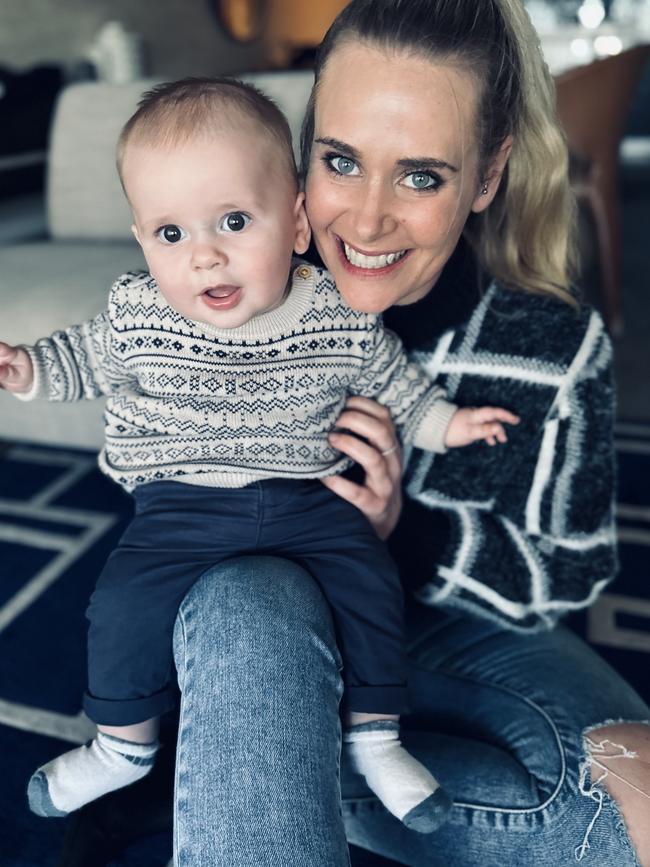
“I want to be a contributing member of society,” she says firmly.
“And honestly, I’m happy to be Kate turning up to a job, and being a good person. That’s enough for me. Kate DeAraugo, the Australian Idol … it’s a life I’m very grateful for, but it means something totally different these days.”
She plans to record and release new music, and perform again, but only when she’s ready.
“I’m writing songs with a clear mind, but at this stage, it’s only for me,” DeAraugo says. “It means no pressure … but it’s made me remember that I love music. Music feeds my soul. When I’m singing, I’m happy. I would love to step back into that world to some degree, but for me, it’s not all about that.”
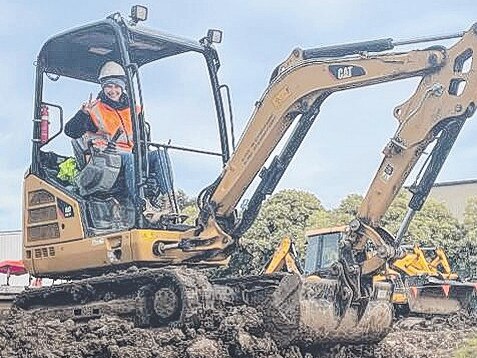
DeAraugo is pleased the music industry has evolved slightly since her reign as Idol, and comments about body shape and size are regularly called out.
“It’s a different world, and that kind of judgment is not OK anymore,” she says, then laughs: “I’ve had to learn that my voice has no idea what my arse looks like in a pair of jeans.”
Meanwhile, for now, a different spotlight is calling: Motherhood.
“It’s an extreme sport,” she says, smiling brightly.
“We do swimming, we do Weet-Bix, we do Ms Rachel. We hang out. I’m teaching him, and watching him discover things for the first time, and it’s the most beautiful thing.
“He did something so small the other day – he learned to put a cup within a cup – and it was the proudest moment of my life.
“I laughed at myself like, ‘Oh, Kate! What’s become of you?’.”



